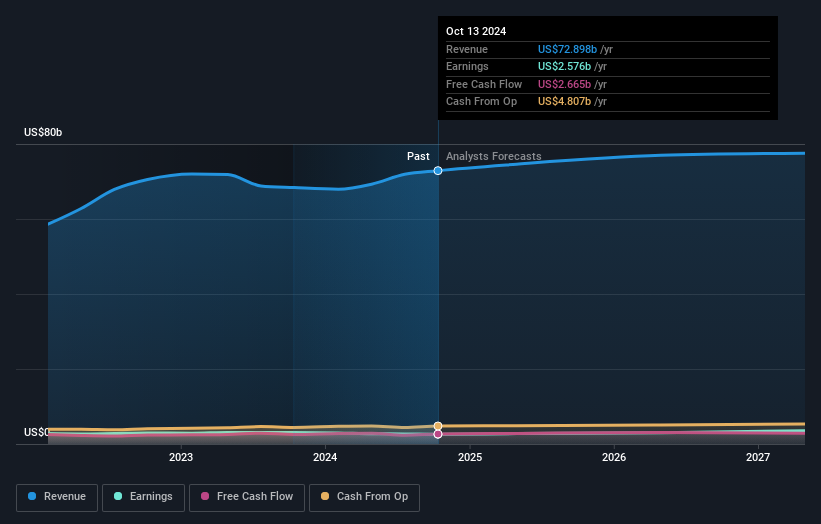- Canada
- /
- Food and Staples Retail
- /
- TSX:ATD
Alimentation Couche-Tard Inc.'s (TSE:ATD) top owners are retail investors with 47% stake, while 35% is held by institutions

Key Insights
- Significant control over Alimentation Couche-Tard by retail investors implies that the general public has more power to influence management and governance-related decisions
- A total of 25 investors have a majority stake in the company with 47% ownership
- Insiders have been buying lately
A look at the shareholders of Alimentation Couche-Tard Inc. (TSE:ATD) can tell us which group is most powerful. With 47% stake, retail investors possess the maximum shares in the company. In other words, the group stands to gain the most (or lose the most) from their investment into the company.
Meanwhile, institutions make up 35% of the company’s shareholders. Generally speaking, as a company grows, institutions will increase their ownership. Conversely, insiders often decrease their ownership over time.
Let's delve deeper into each type of owner of Alimentation Couche-Tard, beginning with the chart below.
View our latest analysis for Alimentation Couche-Tard

What Does The Institutional Ownership Tell Us About Alimentation Couche-Tard?
Institutions typically measure themselves against a benchmark when reporting to their own investors, so they often become more enthusiastic about a stock once it's included in a major index. We would expect most companies to have some institutions on the register, especially if they are growing.
As you can see, institutional investors have a fair amount of stake in Alimentation Couche-Tard. This suggests some credibility amongst professional investors. But we can't rely on that fact alone since institutions make bad investments sometimes, just like everyone does. If multiple institutions change their view on a stock at the same time, you could see the share price drop fast. It's therefore worth looking at Alimentation Couche-Tard's earnings history below. Of course, the future is what really matters.

Alimentation Couche-Tard is not owned by hedge funds. Les Développements Orano inc. is currently the largest shareholder, with 12% of shares outstanding. For context, the second largest shareholder holds about 5.6% of the shares outstanding, followed by an ownership of 4.4% by the third-largest shareholder.
Our studies suggest that the top 25 shareholders collectively control less than half of the company's shares, meaning that the company's shares are widely disseminated and there is no dominant shareholder.
While studying institutional ownership for a company can add value to your research, it is also a good practice to research analyst recommendations to get a deeper understand of a stock's expected performance. There are a reasonable number of analysts covering the stock, so it might be useful to find out their aggregate view on the future.
Insider Ownership Of Alimentation Couche-Tard
The definition of company insiders can be subjective and does vary between jurisdictions. Our data reflects individual insiders, capturing board members at the very least. Company management run the business, but the CEO will answer to the board, even if he or she is a member of it.
Most consider insider ownership a positive because it can indicate the board is well aligned with other shareholders. However, on some occasions too much power is concentrated within this group.
We can see that insiders own shares in Alimentation Couche-Tard Inc.. The insiders have a meaningful stake worth CA$3.4b. we sometimes take an interest in whether they have been buying or selling.
General Public Ownership
With a 47% ownership, the general public, mostly comprising of individual investors, have some degree of sway over Alimentation Couche-Tard. While this size of ownership may not be enough to sway a policy decision in their favour, they can still make a collective impact on company policies.
Private Company Ownership
Our data indicates that Private Companies hold 14%, of the company's shares. It might be worth looking deeper into this. If related parties, such as insiders, have an interest in one of these private companies, that should be disclosed in the annual report. Private companies may also have a strategic interest in the company.
Next Steps:
It's always worth thinking about the different groups who own shares in a company. But to understand Alimentation Couche-Tard better, we need to consider many other factors. Take risks for example - Alimentation Couche-Tard has 1 warning sign we think you should be aware of.
Ultimately the future is most important. You can access this free report on analyst forecasts for the company.
NB: Figures in this article are calculated using data from the last twelve months, which refer to the 12-month period ending on the last date of the month the financial statement is dated. This may not be consistent with full year annual report figures.
New: Manage All Your Stock Portfolios in One Place
We've created the ultimate portfolio companion for stock investors, and it's free.
• Connect an unlimited number of Portfolios and see your total in one currency
• Be alerted to new Warning Signs or Risks via email or mobile
• Track the Fair Value of your stocks
Have feedback on this article? Concerned about the content? Get in touch with us directly. Alternatively, email editorial-team (at) simplywallst.com.
This article by Simply Wall St is general in nature. We provide commentary based on historical data and analyst forecasts only using an unbiased methodology and our articles are not intended to be financial advice. It does not constitute a recommendation to buy or sell any stock, and does not take account of your objectives, or your financial situation. We aim to bring you long-term focused analysis driven by fundamental data. Note that our analysis may not factor in the latest price-sensitive company announcements or qualitative material. Simply Wall St has no position in any stocks mentioned.
About TSX:ATD
Alimentation Couche-Tard
Operates and licenses convenience stores in North America, Europe, and Asia.
Undervalued second-rate dividend payer.

